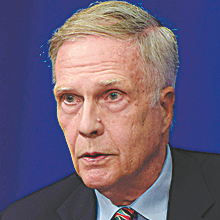

Working in shifts from about 10 pm, Lord spent the next few hours doing a redraft of the Chinese draft communique. About 3 am he woke Kissinger, who continued the work until the two went to see the Chinese in the morning. The two sides then engaged themselves for the next two days in redrafting and counter-drafting, before "we had about 80 to 85 percent of the communique done".
The remaining part, and most contentiously the Taiwan question, were being dealt with by the two together with their Chinese counterparts while Richard and Pat Nixon toured historical sites.
"We had really tough negotiations on Taiwan, day after day, right down to the wire," Lord said.
The Shanghai Communique, which opened with separate statements from both sides instead of a joint declaration, was issued on the afternoon of Feb 28 on the grounds of the Jinjiang Hotel. (Nixon and his entourage left Beijing for Hangzhou on the morning of Feb 26, where they did more sightseeing, before arriving in Shanghai, their final stop in China, the next day.)
"There's never been a communique before in a sense like the Shanghai Communique," Lord said, referring to Zhou's approach. "Its merits have been proven because after 50 years it is still being invoked as one of the foundations of our relationship, while most communiques disappear within weeks."
The Taiwan part comes toward the end of the communique. "The Chinese side reaffirmed its position... the Government of the People's Republic of China is the sole legal government of China," it goes."The US side declared: The United States acknowledges that all Chinese on either side of the Taiwan Straits maintain there is but one China and that Taiwan is a part of China. The United States Government does not challenge that position."
One day before the communique was issued Zhou paid a surprise visit to Rogers, while "we were unpacking" in Rogers' suite in the Jinjiang Hotel, said Platt. The meeting was "cordial", and when it ended, Rogers turned to his special assistant and asked,"What was that all about?"
"I thought Zhou was trying to make up for the exclusion of Rogers from the meeting with Mao," Platt said. "Later when he got home, the US press asked him how he felt about being left out of that meeting, and Rogers' response was that the Chinese paid a lot of attention to me, particularly Premier Zhou."